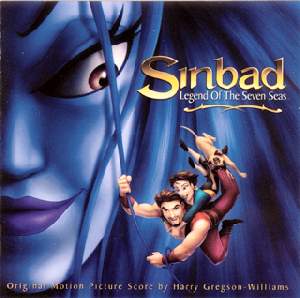************************************************************** EDITOR’s RECOMMENDATION July 2003 **************************************************************
Sinbad: Legend of the Seven Seas
Music composed by Harry Gregson-Williams
Available on Dreamworks B0000733-02
Running time: 64.52
Amazon US

You wait for ages then three come along at once; animated movies with an aquatic/nautical theme that is. First it was James Newton Howard with Treasure Planet, then Thomas Newman's Finding Nemo, and now Harry Gregson-Williams with Sinbad: Legend of the Seven Seas. The film is a swashbuckling fantasy adventure, and like the others, happily not a musical. It is a Dreamworks production, which is to say it comes from the Steven Spielberg stable. Putting these factors together its easy to work out that the score is firmly in the old-school sweeping orchestral tradition Spielberg's long-time collaborator John Williams revived for the Star Wars and Indiana Jones movies. Why, the composer is even called Williams.
So Sinbad is a pastiche of a pastiche, Harry Gregson-Williams doing John Williams doing Erich Wolfgang Korngold (with a Dash of David Arnold's Independence Day), and if that idea doesn't appeal you may as well stop reading now. For everyone else who loves a good rousing swashbuckling score, you've come to the right place. This is even more fun than Treasure Planet, without the occasional electric guitar intrusions or rock songs, but with a smattering of electronics which some will find unwelcome. The opening cue, "Let The Games Begin" introduces the most exhilarating heroic Hollywood fanfare and main theme in a long time. It recurs through the score, in "The Sea Monster" meeting a propulsive motif which rapidly calls to mind John Williams' "Hyperspace" from The Empire Strikes Back, but also Michael Torke's Javelin.
Balancing the heroics, "Proteus Proposes" introduces an nicely lyrical love theme, while "Eric Steals The Book" and "Lighting Lanterns" take the score in a more contemporary, Media Ventures (Hans Zimmer, et al) electro-acoustic direction. "The Stowaway" is back to an eloquent playfulness which would not have been far out of place in Max Steiner's The Adventures of Don Juan, while "The Sirens" are characterised by beautifully crafted wordless female vocals which switch from sultry to sinister in a moment. "Surfing" could even have graced The Adventures of Robin Hood, (had Robin Hood gone surfing of course). It's only really the brief rock beat in "Rescue!" that lets things down a little, and there is perhaps not quite the variety of material to sustain the lengthy playing time and fully engage the attention.
Nevertheless with copious highlights mixing romance, adventure and comic high-jinx to perfection, this is a delightful disc for those who can't get enough of the Golden Age of Hollywood sound as reinvented by John Williams. It confirms, as if confirmation were needed, that Harry Gregson-Williams is one of the talents in Hollywood.
Gary Dalkin
4
Return to Index